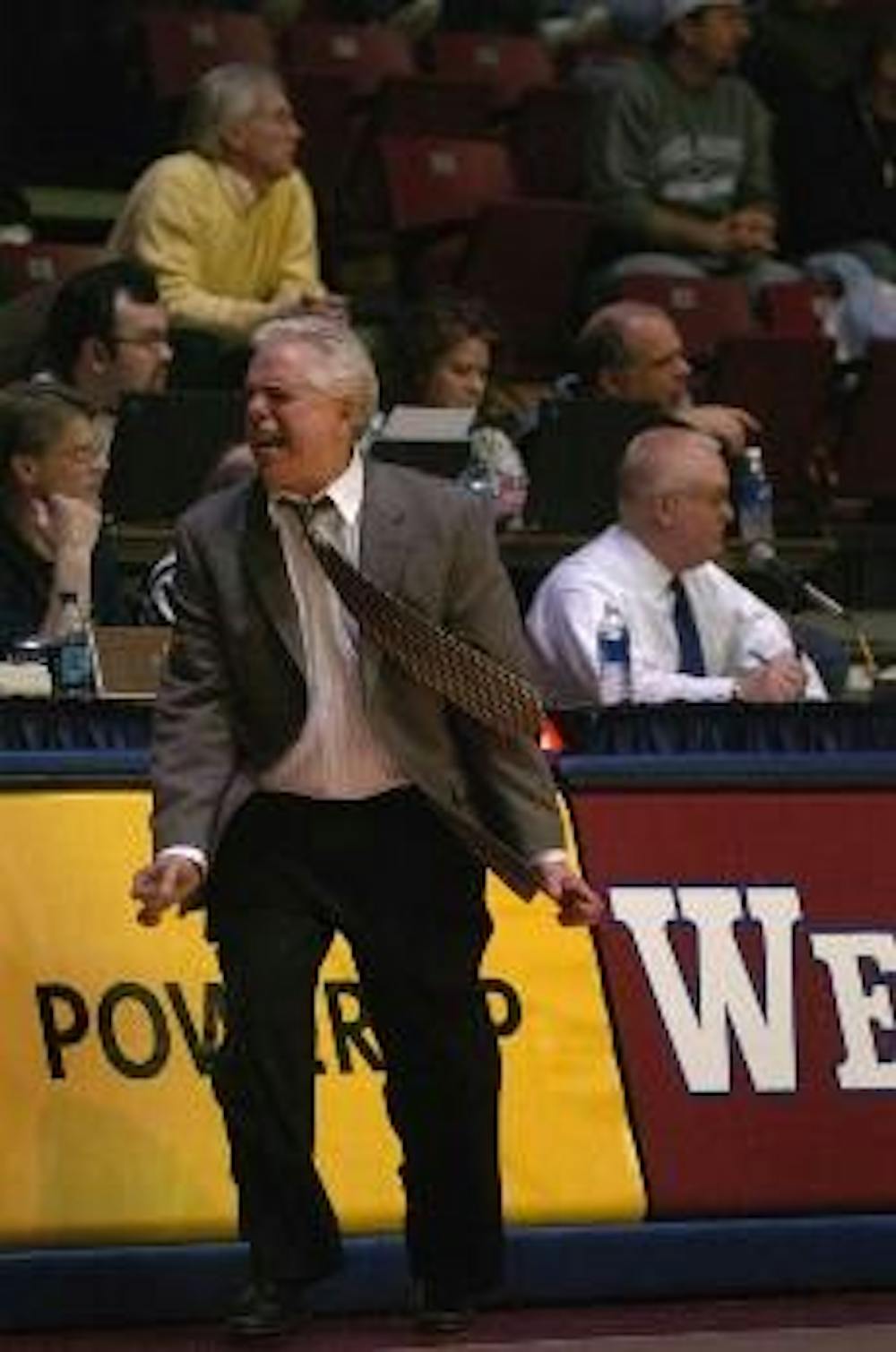
Following a Jan. 15 loss to Seton Hall, the women's basketball team had a 16-day break before its next game against Harvard.
But the time off was not a voluntary choice for Penn coach Pat Knapp, who feared that his squad would get rusty. The layoff was just one of several unfortunate byproducts of the unusual Ivy League schedule.
"Of all the things that I had to adjust to when I came here . different academics, different competition, different travel situations - scheduling was one that I was not aware of walking right in the door," Knapp said.
In order to maximize efficiency, the Ivy League is grouped into four pairs of travel partners based on geographic location. The schedule is set up so that on any given weekend, travel partners have the same two opponents.
But the Ivy League must contend with a unique obstacle to scheduling: Harvard and Princeton hold their final exams after winter break, so they cannot resume playing until the end of January.
"There's no other league in the NCAA, to my knowledge, that has two teams take off in the month of January because of exams," said Knapp, who was the head coach at Georgetown for 18 seasons before coming to Penn.
Ivy League associate director Chuck Yrigoyen agreed that the final exam schedule poses "tremendous challenges" to scheduling.
"It just limits the possible combinations of what we're able to do," Yrigoyen said.
Harvard's and Princeton's travel partners - Dartmouth and Penn, respectively - are most negatively affected. The other two groups (Cornell/Columbia and Yale/Brown) have the same final exam schedules, so they can play against their respective travel partners twice during January.
Although the Quakers are able to play Princeton once in the first week of January, they are left with a void in the schedule for two weeks during Princeton's reading days and finals.
Princeton head coach Courtney Banghart declined to comment on scheduling issues when contacted by phone for an interview.
Last month, Harvard instituted a new academic calendar that will move final exams before winter break starting in the 2009-2010 academic year.
Princeton, however, has confirmed its commitment to having final exams in January, which will essentially leave Penn as the only school with a built-in hole in the schedule.
"We're certainly not going to mandate that they do anything based on athletics," Yrigoyen said. "[Princeton's] academic reasons for keeping the calendar are paramount."
Ideally, Penn could schedule non-conference opponents during that time, but Knapp said that teams are understandably reluctant to interrupt their conference schedules.
"[You might] break up momentum, flow, urgency, [or] take a bye date away from them when they might rest their team," Knapp said. "When I was at Georgetown, I didn't want to play anybody else in January and February but my Big East schedule, so I understand that."
To avoid a break similar to Penn's, Dartmouth - Harvard's travel partner - managed to schedule a Jan. 20 game at Virginia Tech this season, even though the Hokies had already played five of a total of 14 league games.
During the January voids of each of the previous two seasons, Knapp was able to schedule a Big 5 game, against Saint Joseph's in 2007 and La Salle in 2006.
The Quakers were unable to find a January Big 5 opponent this season.
Although Knapp said he was grateful that those schools accommodated him in the past, he is still hoping for increased cooperation between the Big 5 women's teams.
"We've come to some agreements with the Big 5 women - I'm not going to say who - that I'm reasonably happy with what we're doing," Knapp said. "And with others, I'm not happy."
He acknowledged that the Big 5 schools have no obligation to help him, but he also pointed out that the men's teams have a better arrangement. Under Fran Dunphy and Glen Miller, the Quakers have regularly played two to three Big 5 games in the second half of January.
Another striking difference between the Ivy League and the major conferences is the use of what Knapp calls "guarantee" games.
"At Georgetown, we would pay two or three teams to come to our gym to get beat - that simple" Knapp said. "We got to pick who we wanted to play and where, and paid them to beat them. Ivy League teams don't do that. More times than not, Ivy League teams are the teams taking those guarantee games in our day and age."
However, outside of a small bonus for playing in the St. Peter's tournament on Dec. 29 and 30, Penn did not receive money to play any of its games this season.
But some other teams, Knapp said, will receive $15,000 to $20,000 for playing an opponent in a larger conference, such as the ACC. And two years ago, then-Princeton coach Dick Barron told Knapp and other Ivy coaches that Princeton was offered $40,000 for one game at Baylor.
Barron, who was replaced by Banghart after last season, is now the associate head coach at Baylor.
Although the problems with scheduling are easy to identify, Knapp and Yrigoyen agree that there are no easy solutions.
And the overriding factor that makes scheduling so difficult is arguably what makes the Ancient Eight so special. Unlike in the big-money conferences, academics usurp athletics in the Ivy League.
"Our league is a league that is based on the academic experience," Yrigoyen said. "There are academic reasons [for the scheduling problems], and that's what's always going to win the day in the Ivy League."
The Daily Pennsylvanian is an independent, student-run newspaper. Please consider making a donation to support the coverage that shapes the University. Your generosity ensures a future of strong journalism at Penn.
DonatePlease note All comments are eligible for publication in The Daily Pennsylvanian.





